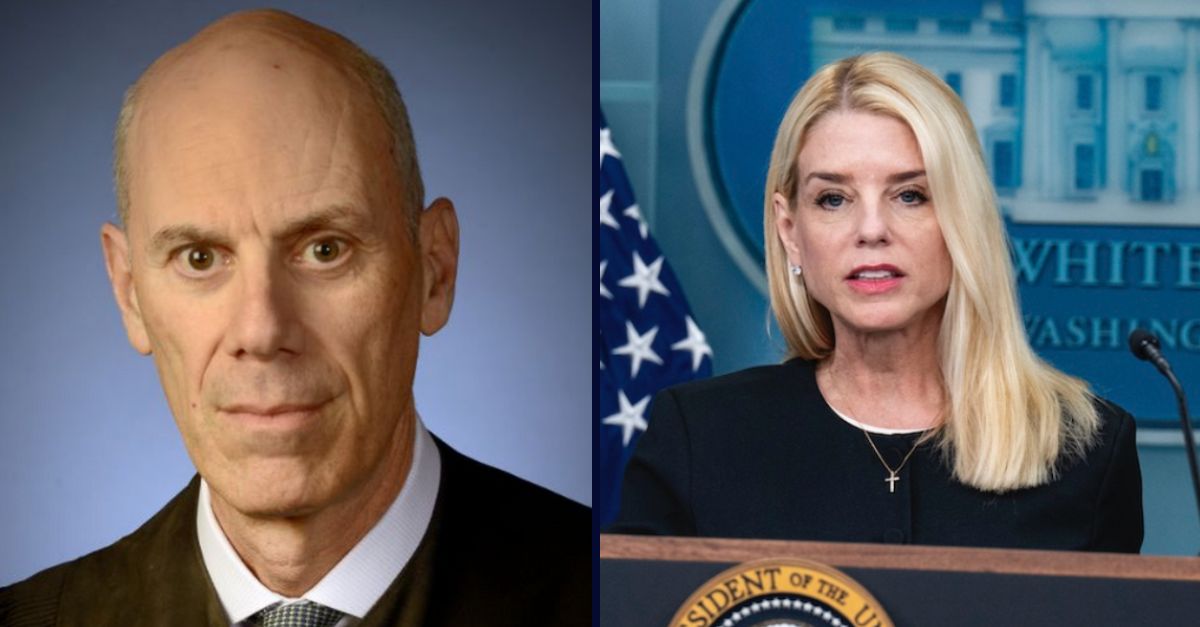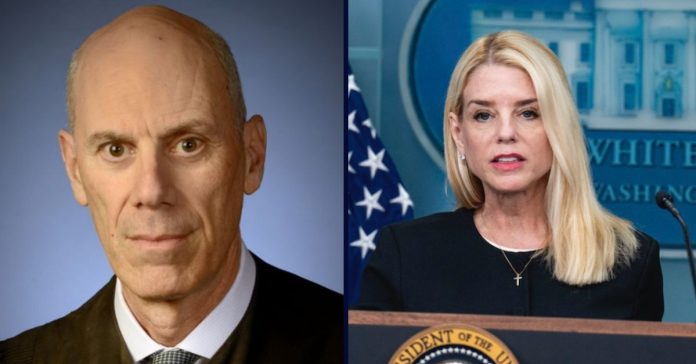
Left: Chief U.S. District Judge James Boasberg (U.S. District Courts). Right: U.S. Attorney General Pam Bondi speaks at a press briefing with U.S. President Donald Trump in the James S. Brady Press Briefing Room in the White House in Washington, DC on Friday, June 27, 2025 (Photo by Annabelle Gordon/Sipa USA)(Sipa via AP Images).
Ratcheting up attacks on the judiciary for holding the Trump administration accountable, the U.S. Department of Justice, at Attorney General Pam Bondi”s “direction,” filed a judicial misconduct complaint against Chief U.S. District Judge James Boasberg, claiming that he spoke out of school at a conference to influence Chief Justice John Roberts into believing that a “constitutional crisis” brought about by Trump administration lawlessness was imminent.
Boasberg, the judge in the Alien Enemies Act (AEA) case of J.G.G. v. Trump, in April held the Trump administration in criminal contempt for defying an order blocking summary deportations of alleged Venezuelan gang members, an issue central to principal associate deputy attorney general Emil Bove’s confirmation.
The complaint, signed by Bondi’s chief of staff Chad Mizelle and submitted to Chief U.S. Circuit Judge Sri Srinivasan, of the District of Columbia Circuit, seeks “corrective measures” including the reassignment of J.G.G. v. Trump to another judge, a public reprimand, and “referral to the Judicial Conference for consideration of impeachment-related recommendations, if the committee finds willful misconduct.”
All of this is based on a report by the conservative website the Federalist, which on July 16 cited a memo of a non-public March 11 conference in which Boasberg “raised his colleagues’ concerns that the Administration would disregard rulings of federal courts leading to a constitutional crisis.”
The report, citing a memo which itself is not public, stated that Roberts “expressed hope that would not happen and in turn no constitutional crisis would materialize.”
According to the complaint, Boasberg’s remarks about President Donald Trump and his administration were “improper” and “undermined the integrity and impartiality of the judiciary.”
“On March 11, 2025, Judge Boasberg attended a session of the Judicial Conference of the United States, which exists to discuss administrative matters like budgets, security, and facilities,” the complaint said. “While there, Judge Boasberg attempted to improperly influence Chief Justice Roberts and roughly two dozen other federal judges by straying from the traditional topics to express his belief that the Trump Administration would ‘disregard rulings of federal courts’ and trigger ‘a constitutional crisis.'”
Love true crime? Sign up for our newsletter, The Law&Crime Docket, to get the latest real-life crime stories delivered right to your inbox
Notably, the complaint asserted that the Trump administration has “always complied with all court orders.”
“Although his comments would be inappropriate even if they had some basis, they were even worse because Judge Boasberg had no basis — the Trump Administration has always complied with all court orders. Nor did Judge Boasberg identify any purported violations of court orders to justify his unprecedented predictions.”
Just days after the conference, however, Boasberg orally issued a temporary restraining order blocking deportation flights to El Salvador and demanding that any planes in the air turn around.
The Trump administration flouted that order, and since that time DOJ whistleblowers have alleged that Emil Bove, Trump’s former criminal defense lawyer and nominee for a lifetime judgeship on the 3rd U.S. Circuit Court of Appeals, had suggested DOJ might have to give the courts an “f— you” if blocked from carrying out mass deportations pursuant to the AEA, an 18th-century wartime law that has only been invoked three times in American history.
Boasberg, a Barack Obama appointee, responded in April by holding the Trump administration in criminal contempt.
“The Court does not reach such conclusion lightly or hastily; indeed, it has given Defendants ample opportunity to rectify or explain their actions. None of their responses has been satisfactory,” Boasberg wrote. “The Constitution does not tolerate willful disobedience of judicial orders — especially by officials of a coordinate branch who have sworn an oath to uphold it. To permit such officials to freely ‘annul the judgments of the courts of the United States’ would not just ‘destroy the rights acquired under those judgments’; it would make ‘a solemn mockery’ of ‘the constitution itself.’ ‘So fatal a result must be deprecated by all.'”
The DOJ complaint alleged that Boasberg’s judicial conference remarks and warnings showed he had a “preconceived belief that the Trump Administration would not follow court orders.”
The complaint further suggested that, because the U.S. Supreme Court later “summarily vacated” Boasberg’s temporary restraining order, the administration was essentially proven right to ignore him.
“First, although he lacked authority to do so, he issued a temporary restraining order preventing the Government from removing violent Tren de Aragua terrorists, which the Supreme Court summarily vacated,” the complaint said. “Throughout the proceedings, Judge Boasberg rushed the government through complex litigation, sometimes giving the Trump Administration less than 48 hours to respond and threatening criminal-contempt proceedings and the appointment of an outside prosecutor against senior Trump Administration officials for failing to comply with an order that had already been vacated.”
“Undeterred by the Supreme Court’s reversal,” the complaint added later, “Judge Boasberg still proceeded to issue a 46-page show-cause opinion threatening criminal contempt and the appointment of an outside prosecutor. Since then, the D.C. Circuit has also recognized Judge Boasberg’s errors, staying his decisions twice.”
On Monday, Bondi posted on X that Boasberg has “undermined the integrity of the judiciary.”
“Today at my direction, @TheJusticeDept filed a misconduct complaint against U.S. District Court Chief Judge James Boasberg for making improper public comments about President Trump and his Administration,” the AG said. “These comments have undermined the integrity of the judiciary, and we will not stand for that.”
The complaint came mere days after Bondi claimed that New Jersey federal judges exercising their statutory authority not to appoint Alina Habba as U.S. attorney went “rogue” and “threaten[ed] the President’s core Article II powers.”
Various legal commentators reacted by calling Bondi “corrupt” and the complaint “ridiculous and frivolous,” “full of Trump administration lies,” thuggish and “shameful,” and “simply not credible.”
NYU law professor emeritus Stephen Gillers, a leading legal and judicial ethics expert, told Law&Crime that, assuming the DOJ’s complaint accurately quoted Boasberg, it “should be dismissed.”
“The statutory basis for disciplining a federal judge is in 28 USC 351,” when a judge has “engaged in conduct prejudicial to the effective and expeditious administration of the business of the courts,” said Gillers. “In some circuits, the Code of Judicial Conduct for U.S. Judges, which the complaint quotes, may be considered in deciding whether this section 351 basis is present, but a Code violation alone cannot be the basis for discipline.”
“The quotation attributed to Boasberg does not violate section 351. For one thing, it matters where the statement was made,” he added, emphasizing the non-public nature of the remarks. “It was allegedly made at a meeting of the Judicial Conference of the U.S., a small group of experienced federal judges, including the chief justice.”
Gillers concluded that the complaint is “simply not credible” and should be jettisoned by Srinivasan.
“The suggestion that these judges would be prejudicially influenced by Boasberg’s expression of ‘concerns,’ or that his statement would prejudice the ‘expeditious administration of the business of the courts,’ is simply not credible,” he said. “The complaint should be dismissed.”
Others have wondered why, if Boasberg’s non-public remarks behind closed doors to other judges were so offensive, it took months for the DOJ to file a formal complaint.
Still others have noted that Roberts himself rebuked Trump for calling for Boasberg’s impeachment just days after the judge issued the TRO in March.
“For more than two centuries, it has been established that impeachment is not an appropriate response to disagreement concerning a judicial decision,” Roberts said. “The normal appellate review process exists for that purpose.”
Read the DOJ’s complaint here.

